Filter by Category:
Search
Year
- Category: Research Briefs
- Clear Filters
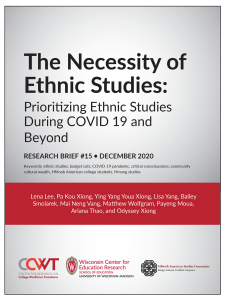 Lee, L., Xiong, P., Xiong, Y., Yang, L., Smolarek, B., Vang, M., Wolfgram, M., Moua, P., Thao, A. & Xiong, O. (2020). The Necessity of Ethnic Studies: Prioritizing Ethnic Studies During COVID 19 and Beyond. Center for Research on College-Workforce Transitions (Research Brief #16). University of Wisconsin–Madison, Wisconsin Center for Education Research.
Lee, L., Xiong, P., Xiong, Y., Yang, L., Smolarek, B., Vang, M., Wolfgram, M., Moua, P., Thao, A. & Xiong, O. (2020). The Necessity of Ethnic Studies: Prioritizing Ethnic Studies During COVID 19 and Beyond. Center for Research on College-Workforce Transitions (Research Brief #16). University of Wisconsin–Madison, Wisconsin Center for Education Research.
Abstract: The Covid-19 pandemic has caused a devastating ripple effect on educational institutions—from budget cuts to health and safety concerns to changes in learning environments. In higher education specifically, Covid-19 is disrupting student lives by interrupting in-person learning, forcing students out of their living spaces, and causing students to suffer financially. The consequences of the pandemic have also led to financial crises for universities, causing administrators to make challenging budgetary decisions. Unfortunately, during times of budget scarcity, colleges and universities have historically opted—and continue to opt—for cuts that impact students of color profoundly, including deep cuts to diversity and inclusion efforts and ethnic studies programs, suspensions of ethnic studies faculty hiring, and even resulting in the termination of tenure-track faculty positions in ethnic studies (Bikales & Chen, 2020; Meyerhofer, 2020; Myers, 2014; Wang, 2016).
University administrators are currently having to make hard financial decisions which will have lasting impacts on students, staff, and their communities. Within this looming financial crisis, with multiple competing priorities and far less resources than in the past, in this report, we argue that ethnic studies programs must be prioritized for continued investment. Continued.
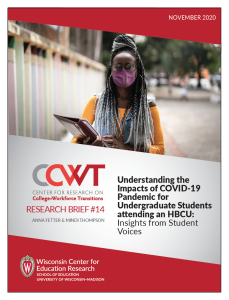 Fetter, A & Thompson, M. (2020). Understanding the Impacts of COVID-19 Pandemic for Undergraduate Students attending an HBCU: Insights from Student Voices. Center for Research on College-Workforce Transitions (Research Brief #14). University of Wisconsin–Madison, Wisconsin Center for Education Research.
Fetter, A & Thompson, M. (2020). Understanding the Impacts of COVID-19 Pandemic for Undergraduate Students attending an HBCU: Insights from Student Voices. Center for Research on College-Workforce Transitions (Research Brief #14). University of Wisconsin–Madison, Wisconsin Center for Education Research.
Executive Summary: Limited attention has been paid to the impact of COVID-19 on college students who are attending minority-serving institutions, despite the disproportionate toll COVID-19 has on minoritized communities and the worsening of pre-existing inequity brought about by the pandemic (Kantamneni, 2020; Kimbrough, 2020; Strada, 2020). It is vital to understand experiences with COVID-19 among college students who are attending Historically Black Colleges and Universities (HBCUs), which serve as primary educational pathways for Black students in the U.S. Themes from our interviews with 41 students attending an HBCU highlight that students are experiencing significant work-related, academic, financial, and socio-emotional challenges related to COVID-19. Stressors and concerns were viewed by students as interrelated and cumulative. In addition, themes from the interviews suggested that student stressors must be viewed within the contexts of the higher education institution, student life experiences and circumstances, and their positionality within large structural systems. Given the far-ranging and ongoing impacts of COVID-19 on higher education, this Research Brief concludes with recommendations to advocate for and support students.
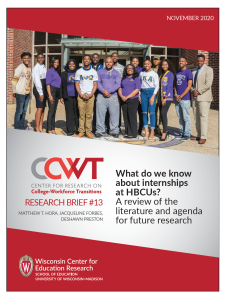 Hora, M., Forbes, J., & Preston, D. (2020). What do we know about internships at HBCUs? A review of the literature and agenda for future research. Center for Research on College-Workforce Transitions (Research Brief #13). University of Wisconsin–Madison, Wisconsin Center for Education Research.
Hora, M., Forbes, J., & Preston, D. (2020). What do we know about internships at HBCUs? A review of the literature and agenda for future research. Center for Research on College-Workforce Transitions (Research Brief #13). University of Wisconsin–Madison, Wisconsin Center for Education Research.
Abstract: Internships and other high-impact practices (HIPs) that feature experiential learning are being increasingly promoted at Historically Black Colleges & Universities (HBCUs) as a way to support students’ career and academic success. In this paper we review the literature on what is known about HIPs and internships at HBCUs and how students’ racial identities have influenced interns’ experiences and outcomes. Our analysis finds little empirical research on internships at HBCUs and a general lack of in-depth and critical analysis on the ways that racial identity and the unique institutional cultures of HBCUs impact internships and Black student experiences. We then review contextual forces salient to Black interns’ experiences such as pervasive workplace discrimination, and theoretical frameworks that could inform future research on the ways that race, culture, institutional features and local “field effects” interact to shape student experiences and professional development. We conclude by outlining a research agenda for studying internships that foregrounds issues of racial justice, adopts elements of Bourdieu’s relational sociology, and investigates how the unique cultures of HBCUs influence how internships are designed, implemented and experienced.
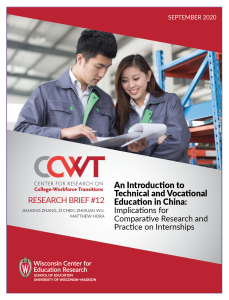 Zhang, J., Chen, Z., Wu, Z., & Hora, M. (2020). An Introduction to Technical and Vocational Education in China: Implications for Comparative Research and Practice on Internships. Research Brief #12. Center for Research on College-Workforce Transitions. UW-Madison.
Zhang, J., Chen, Z., Wu, Z., & Hora, M. (2020). An Introduction to Technical and Vocational Education in China: Implications for Comparative Research and Practice on Internships. Research Brief #12. Center for Research on College-Workforce Transitions. UW-Madison.
Abstract: Internship plays an important role in students’ career preparation and college-to-workforce transition. Although there are a large body of studies on college student internships, there were relatively fewer on that of technical and vocational education and training (TVET) students. Such a critical topic worth more attention and exploration. This report focuses on TVET system in China considering that China has the largest but under-developed TVET system in the world which prioritizes economic development and social mobility as its main missions. The aim of this report is to systematically introduce the TVET and its internship policies in China. The report presents the unique structure, the history, and development of China’s secondary and higher TVET. Notably, along with a downward trend of the secondary TVET since 2010, there had been an upward trend of the higher TVET since the late 1990s’ in contrast. Overall, issued policies largely influence the direction of Chinese TVET development, especially in regard to regulating internship activities in aspects of internship organization, management, assessment. Implications for research and policymaking for internships in China and the U.S. were discussed. This report provides insights to international scholars who are interested in conducting comparative studies on internship in TVET systems.
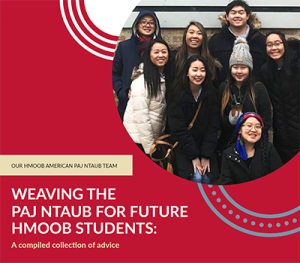 Moua, P., Thao, A., Xiong, O., Lee, L., Smolarek, B., Vang, M. N., Wolfgram, M., Xiong, P. K., Xiong, Y. Y., & Yang, L. (2020). Weaving the Paj Ntaub for future HMoob Students: A compiled collection of advice. Wisconsin Center for Education Research. University of Wisconsin-Madison.
Moua, P., Thao, A., Xiong, O., Lee, L., Smolarek, B., Vang, M. N., Wolfgram, M., Xiong, P. K., Xiong, Y. Y., & Yang, L. (2020). Weaving the Paj Ntaub for future HMoob Students: A compiled collection of advice. Wisconsin Center for Education Research. University of Wisconsin-Madison.
Abstract: This report intends to share the knowledge and advice of current and former HMoob students who attended the University of Wisconsin-Madison. With their responses, the Paj Ntaub research team gleaned advice that these participants wished to pass along to current and future HMoob students. Through many of our interviews, participants shared advice on subjects that they themselves wished they had received during their time at UW-Madison.These responses came from 36 current students 31 former students with a total of 71 individuals and encompassed ideas around lack of familiarity with campus, making career decisions, experiences tied specifically to multidimensional identities, and stereotypes associated with attending UW-Madison. Students come to college with different experiences, goals, and expectations and this may lead to contradicting advice. In this report, we understand and want to shed light on these experiences by giving the space for each and every type of advice.
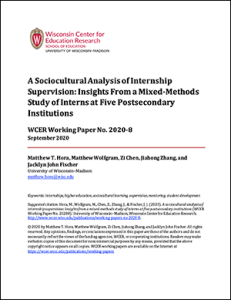 Hora, M.T., Wolfgram, M., Chen, Z., Zhang, J. & Fischer, J. (2020). A sociocultural analysis of internship supervision: Insights from a mixed-methods study at five postsecondary institutions. WCER Working Paper 2020-8. Wisconsin Center for Education Research. University of Wisconsin-Madison.
Hora, M.T., Wolfgram, M., Chen, Z., Zhang, J. & Fischer, J. (2020). A sociocultural analysis of internship supervision: Insights from a mixed-methods study at five postsecondary institutions. WCER Working Paper 2020-8. Wisconsin Center for Education Research. University of Wisconsin-Madison.
Abstract: Internships are widely promoted extra-curricular experiences that can have positive impacts on student outcomes, yet how specific elements of internships contribute to these outcomes and facilitate learning is understudied. In this sequential mixed-methods study, we use sociocultural learning theory to interpret data from surveys (n = 435) and focus groups (n = 52) with students at five postsecondary institutions. After stepwise linear regression analyses indicated that supervisor behaviors were significantly associated with intern satisfaction and career development, analyses of qualitative data revealed features of positive (clear communication, availability, feedback) and negative (unavailability, inattention to learning) aspects of supervision. These results highlight the value of legitimate peripheral participation in internships, and the need for colleges and employers to carefully design and monitor these pedagogic spaces.
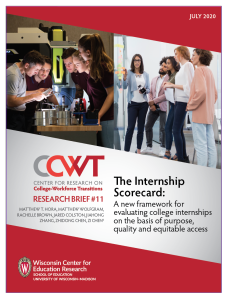 Hora, M.T., Wolfgram, M., Brown, R., Colston, J., Zhang, J., Chen, Z., & Chen, Z. (2020). The Internship Scorecard: A new framework for evaluating college internships on the basis of purpose, quality and equitable access. Research Brief #11. Center for Research on College-Workforce Transitions. University of Wisconsin-Madison.
Hora, M.T., Wolfgram, M., Brown, R., Colston, J., Zhang, J., Chen, Z., & Chen, Z. (2020). The Internship Scorecard: A new framework for evaluating college internships on the basis of purpose, quality and equitable access. Research Brief #11. Center for Research on College-Workforce Transitions. University of Wisconsin-Madison.
Executive Summary: While internships are widely praised and promoted as a “door opener” to opportunity, the impact of these work-based learning programs on students is complicated by the variability in how they are designed, implemented and experienced. Consequently, instead of assuming that participation unequivocally results in positive academic and labor market outcomes, the field needs conceptual tools to distinguish internship programs from one another and to evaluate their efficacy, quality and commitment to equity. In this report we first review various frameworks that distinguish different types of work-based learning and internship programs, and then describe a new framework for distinguishing internships on the basis of purpose, quality and equity – The Internship Scorecard.
This new framework is based on theory and evidence from cultural anthropology, the learning sciences and work-based learning, and is designed for higher education professionals, funders, policymakers and employers so that they can – with more nuance and precision than is currently available – make distinctions between program types and begin to “score” programs at the individual-level or in the aggregate for entire institutions. An example of how the Internship Scorecard can be used in practice is provided, along with next steps for the analysis and improvement of college internship programs.
Note: We are very interested to hear any feedback that you might have about The Internship Scorecard. We are especially interested in hearing your thoughts, critiques and suggestions for how the Scorecard can be used in practice to study and/or evaluate internships.
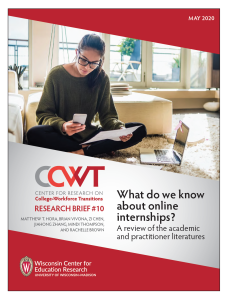 Hora, M.T., Vivona, B.,Chen, Z., Zhang, J., Thompson, M., & Brown, R. (2020). What do we know about online internships? A review of the academic and practitioner literatures. Center for Research on College-Workforce Transitions Research Brief #10. University of Wisconsin-Madison.
Hora, M.T., Vivona, B.,Chen, Z., Zhang, J., Thompson, M., & Brown, R. (2020). What do we know about online internships? A review of the academic and practitioner literatures. Center for Research on College-Workforce Transitions Research Brief #10. University of Wisconsin-Madison.
Abstract: Internships are one of the most widely promoted co-curricular experiences for college students, and the COVID-19 pandemic and resulting shelter-in-place orders led to a substantial growth in the availability and popularity of online internships. However, little is known about the impacts of online internships on student outcomes. In this literature review we present key trends and findings from the academic and practitioner literatures on online internships. Relatively little empirical research exists on online internships, but researchers have found that pre-internship orientations, self-regulated learning, sufficient technology, and effective supervision are important for successful experiences. Our review also highlights that considerable variation exists among online internships, especially with respect to the host organization (i.e., employers or third-party vendors), compliance with standards for legitimate and high-quality internships, and duration. Ultimately, we conclude that standards articulated for “legitimate internships” by the National Association of Colleges and Employers (NACE) and for rigorous experiential learning programs by CCWT should also be applied to online and/or remote internship programs. We conclude our review with recommendations for students, postsecondary professionals, employers and higher education researchers.
